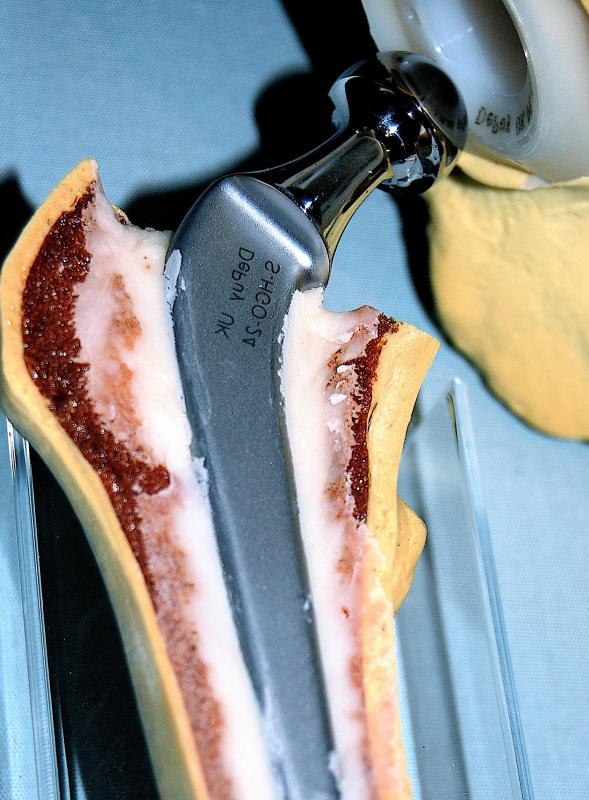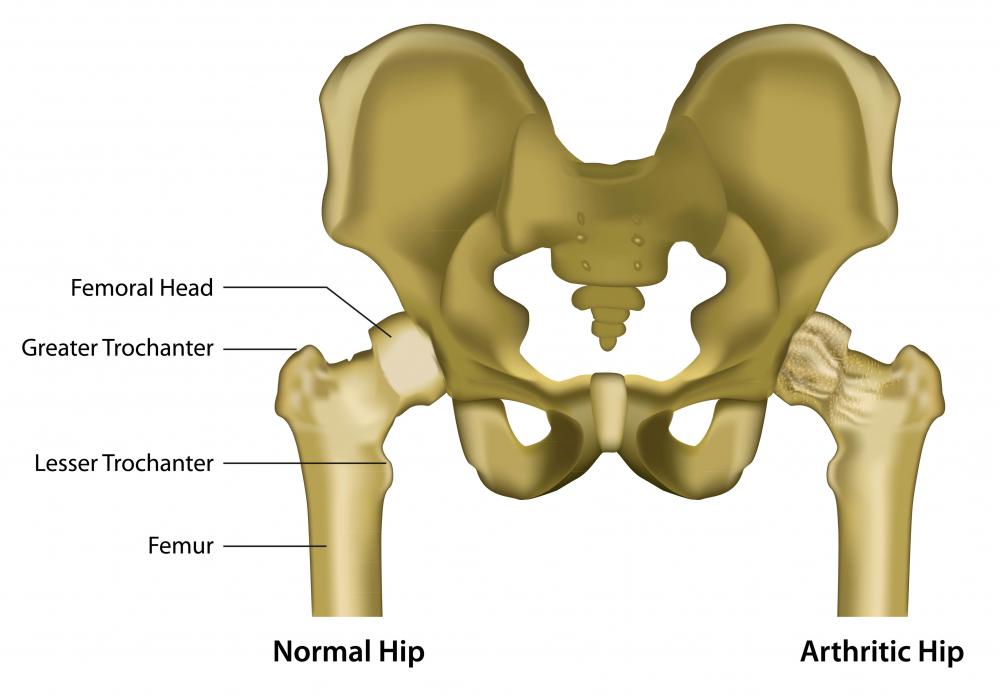At TheHealthBoard, we're committed to delivering accurate, trustworthy information. Our expert-authored content is rigorously fact-checked and sourced from credible authorities. Discover how we uphold the highest standards in providing you with reliable knowledge.
What are the Symptoms of a Hip Replacement Dislocation?
For those with a faulty hip joint, hip replacement surgery can significantly increase mobility, in turn improving quality of life. A small percentage of individuals who undergo this surgery later experience hip replacement dislocation, however. Anyone considering this procedure should learn to recognize the symptoms of a dislocated hip replacement, which can include pain, difficulty walking, and an apparent deformity of the leg. Once a dislocation has been recognized, it should be promptly treated so that full mobility can be restored. Further, precautionary measures should be taken to reduce the chances of dislocation.
Hip replacement surgery is performed on those whose hip joint has ceased to function properly, causing pain and limited mobility. A number of factors can cause impaired hip function, including arthritis, injury, a cyst or tumor, or a circulatory condition. The surgery involves the removal of the faulty ball-and-socket joint followed by its replacement with a prosthetic joint, usually made from ceramic, porcelain, plastic, or a combination of these. After an initial recovery period, hip replacement surgery normally significantly increases mobility and reduces hip pain.

A small number of individuals who undergo this surgery later experience hip replacement dislocation, however. Dislocation generally refers to the movement of the ball component of the hip prosthesis out of the socket component. It most commonly affects those who had their hip replaced less than six months earlier, as the muscles and ligaments which normally support the hip are initially weakened by the procedure.

Symptoms of hip replacement dislocation may include a popping or snapping sound at the moment of dislocation. Also common is pain in the hip, buttock, and upper leg. It may be difficult or impossible to put pressure on the affected leg. Further, the affected leg may appear to be twisted outward, or may seem to be shorter or longer than the other leg.

Individuals experiencing any of these symptoms should consult their physician, who may perform an X-ray to confirm that the hip has indeed become dislocated. Hip replacement dislocation can often be treated fairly easily, with a physician simply guiding the dislocated ball back into its socket. If this treatment is unsuccessful, however, further surgery may be needed.

Those who have had a hip replacement can take precautionary measures to reduce the chances of dislocation. First of all, they should try to avoid bending their hip more than 90 degrees, especially in the months immediately after their surgery. In addition, sitting with the legs crossed and sleeping on the side should be avoided.
AS FEATURED ON:
AS FEATURED ON:

















Discussion Comments
@ Weidinger: My mom is having the EXACT same symptoms and they act like she's crazy. She was thrilled to find this post but wasn't sure how to contact you. Hope you get this!
Ten years following total ceramic left hip replacement I have started to develop loud clicking/clunking snaps with each step. There has been no pain yet, but the sounds are very loud and audible to people walking with me. Do I have reasons to be concerned? Who should I contact for a proper evaluation?
I had a full hip replacement anterially seven weeks ago. The OS said no precautions were necessary. I've had no problems with PT and normal walking since then.
About one week ago, I began having problems, with my hip seeming partially popping out of socket while sitting or squatting and doing something in front of me with my hands. The first time was last Saturday working on a trailer hitch while seated, then again the next day doing something else in front of me while seated.
A couple of days ago, I was using a squeegee while bending over and the popping out of joint put me on my knees in pain. Each time I would undo the movement and it was OK again, The pain persisted each time for a day or so.
Yesterday, after being seated on a coach for quite a while, I was getting up from the couch, even pushing up with my hands, when the partial popping out occurred. I've got an appointment with my OS in a couple weeks, so maybe he will have an explanation. Any comments?
I had a hip replaced in 2000, and dislocated it several years later, then again in 2007, and then just a month ago in 2013. So it can happen to anyone. Each time, I did it bending over after taking a shower.
@turquoise-- I think you didn't have as much pain because it was soon after surgery. Surgery weakens muscles and tendons. If it had occurred after a full hip replacement recovery, you would have been in agonizing pain.
@ddljohn-- I honestly have never heard of this before. Was the replacement faulty?
My ceramic hip replacement dislocated too but it was a month after surgery. It never occurred again. It wasn't as painful as I would have thought. Most of the pain was when it popped out and then it became very difficult to walk.
I have heard however that hip replacements can become loose over time, so maybe that's what happened with your father.
My father's hip replacement became dislocated four years after his surgery! It certainly can occur years later!
He was at the gym working out and apparently heard a popping sound and had intense pain afterward. He didn't go to the hospital until that evening because he thought it might resolve itself. The doctor looked at his legs and saw that one was longer. He pushed the dislocated hip back into place.
Post your comments